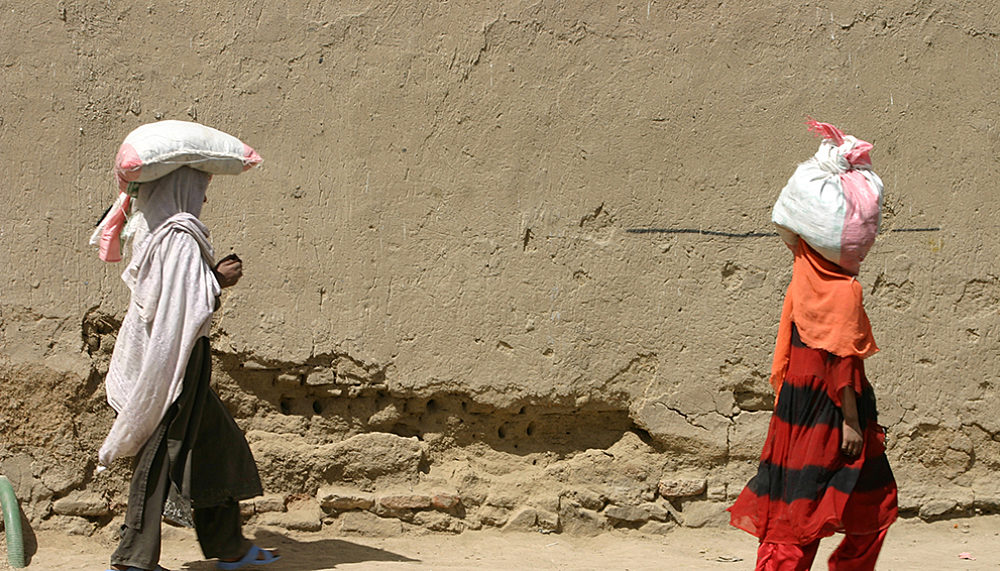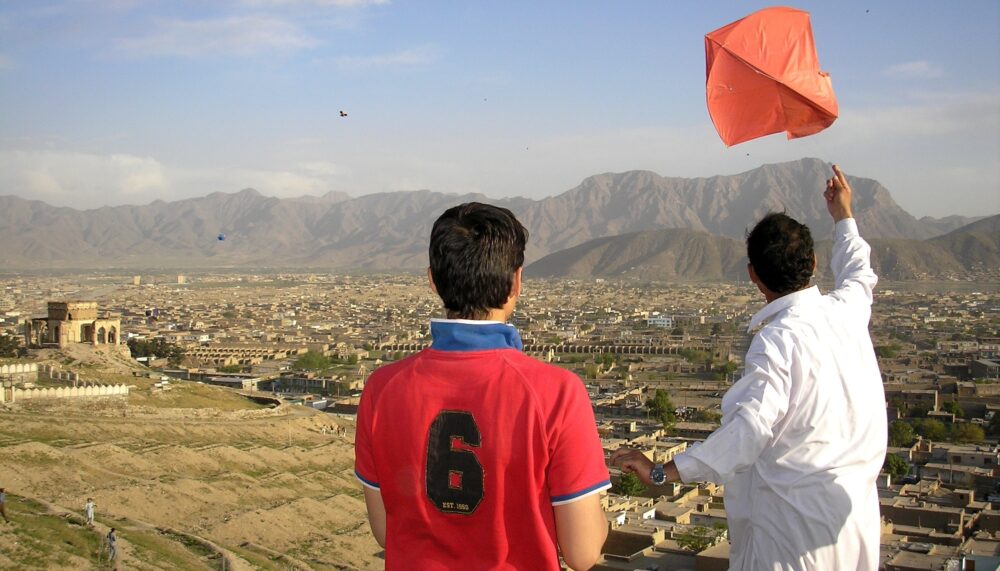BLOG POST | 11 May 2021
Climate and conflict as a vicious cycle: The case of Afghanistan

In Afghanistan, the effects of climate change amplify existing conflicts, creating a struggle for resources. How can this dynamic be tempered?
By Hans-Joachim Giessmann, Charlotte Hamm
Climate change is neither a national phenomenon nor a challenge limited to individual states. Consequences of climate change can be felt more quickly or more strongly in some places; the effects often delayed or spatially separated from the cause. Shifts of less than one degree Celsius in temperature or a few centimetres in sea level determine life and survival in some regions, not to mention economic and social existence.
The responsibility of dealing with the effects of climate change cannot be transferred solely to people in affected regions. In addition to the ethical obligations of cooperation, political responsibility also includes the “polluter pays” principle in order to mitigate the negative consequences of climate change and to counteract the risks of further destabilizing the global climate. This also applies to the interdependency of climate change and the spread of political as well as social violence.
In the Islamic Republic of Afghanistan, which has been marked by armed conflict for decades, the consequences of climate change are becoming increasingly apparent. What should Germany do to support Afghanistan in meeting the twin challenges posed by conflict and climate change?
The impacts of climate change create additional conflicts over resources
In hardly any country is the link between climate change and conflict as clear as in Afghanistan, where a brutal war has been raging for 40 years. A country that itself has made little contribution to global climate change is severely and directly affected by the effects of global warming within its borders. A UNDP report from 2018 highlights that more than 80 per cent of the population in Afghanistan are dependent on subsistence agriculture. Flash floods, earthquakes and landslides provoked by glacier melting, as well as droughts and extreme temperatures, make agricultural work increasingly difficult. These dynamics will continue in the coming year. Drought and crop failure could trigger a nationwide famine.
Dried-up rivers and decades of deforestation drive an increasing scarcity of arable land, provoking further conflict among groups in (often violent) competition over land and resources alongside the country’s existing decades-long conflict. According to the United Nations, 41 per cent of Afghans are directly affected by these land and resource conflicts.
Climate impacts increase poverty and organised crime, fuelling conflict in Afghanistan
These conflict catalysts act against the backdrop of the ongoing war, a fragile and sometimes dysfunctional infrastructure, and the weakened government in Kabul, which controls little more than half of the territory. Under such conditions, the risk of poverty in Afghanistan is growing. According to the UNDP, 56 per cent of Afghanistan's total population already lives below the poverty line. Poverty, in turn, makes it easier for opposition organisations to recruit fighters from rural communities. Many people see no other prospect for themselves or their families than to take up arms in the struggle for limited resources, despite the risk to their lives.
The interplay between climate change and weak governance pushes people toward the illicit economy to ensure their own survival.
In other cases, the interplay between climate change and weak governance pushes people toward the illicit economy to ensure their own survival. Organised criminal groups facilitate this development, but the profits from the drug trade do not benefit local producers. What can farmers do when, as a result of the lack of water, the cultivation of opium poppies is more fruitful than growing grains, and alternatives to the illegal market scarcely exist? Armed conflicts have only exacerbated the problem. Currently, almost all the raw materials of the global heroin market originate in Afghanistan. The state, deeply weakened by war, can hardly fight the established criminal structures, especially since most opium production occurs in areas outside of its control. The power vacuum resulting from the weakened state is partly filled by organised crime groups which, to shield their profits, stifle efforts at conflict management, state-building and development, thereby further entrenching the violent conflicts.
Only a successful peace process can lessen climate change impacts
How can a war-torn, internally divided and deeply exhausted Afghanistan face the challenges of climate change? The Afghan government is keen to develop long-term strategies to establish effective governance structures and boost economic activity. However, functioning state structures are needed to cushion the cumulative climate impact on the country’s entire economic and distribution systems. How can resilient structures be built when the infrastructure is often not only damaged by hostilities, but is even targeted by armed groups seeking to hurt their rivals or intimidate the parts of the population they control? Only peace would allow Afghanistan to maintain and improve its infrastructure in the long run, and for effective cooperation to be established in the interest of a secure common future.
The Afghan peace process offers reason for cautious hope. The mere fact that all relevant Afghan interest groups – from the government, political parties, representatives of civil society and the Taliban movement – have agreed to try to end the armed conflict and seek solutions for a common peaceful future is a strong, positive signal. However, the peace process – including the negotiations between the parties, which began in September 2020 – is still in its infancy. Mutual mistrust is high, and a permanent ceasefire is not yet in sight. But it is a start, and ultimately only the various Afghan parties themselves can resolve the causes of the tensions between them.
Germany – as host of the Petersberg Conference in December 2001, partner nation of the NATO Resolute Support Mission, and second largest donor – has a long and historic friendship with Afghanistan. The special role that Germany has in the eyes of many Afghans brings with it a responsibility to stand by the country.
1. Germany should contribute its climate expertise to the peace negotiations
The German government, in cooperation with other nations, is actively supporting the negotiations between the delegation from the Republic side and the Taliban movement. The Berghof Foundation is on site providing multipartial advice on the negotiation process. Specialist expertise on a wide range of issues related to the cessation of conflicts is requested directly by the negotiating parties. Germany's substantial climate expertise should be brought into the negotiation process in an advisory capacity. The same applies to related risks, in particular issues of internal displacement and urbanisation, the adaptation of the economy to new challenges, and the use of modern green technologies to reduce environmental impacts.
2. Germany should support reconstruction in Afghanistan
The reconstruction or new construction of transport, water and energy infrastructure, damaged for many years by the ongoing war, requires above all technical expertise as well as support in accessing financial and material resources. In order to meet the conditions for such aid, the German government should support Afghanistan in ensuring reliable and transparent control of these funds, as well as their efficient and appropriate use.

3. Germany should promote sustainable development projects in Afghanistan
Many peace agreements fail in the implementation phase. When peace processes fail, international actors’ interest in supporting the processes also diminishes, and resources already provided can go to waste. German expertise in development cooperation should focus on structural projects that sustainably promote the resilience of the economy using climate-friendly criteria. Climate-related cooperation should be included in regular government consultations. Germany should link grants to conditions such as renewable energy, sustainable agriculture and the reduction of emissions from deforestation – and should support Afghanistan accordingly.
4. Germany should provide technical support
The acute consequences of climate change merit urgent attention. The German government should work closely with Afghan experts on the collection and processing of data on climate change as well as its consequences in Afghanistan. The effort involved would be manageable and could be part of the developmental cooperation between the two countries. This could take the form of institutionalised or project-funded cooperation between two or more relevant scientific institutions from both countries. Neighbouring countries could also be involved, as a contribution to bolstering a stable regional context for Afghanistan on its path to peace.
5. Germany should promote the management of climate security risks in multilateral fora
Simultaneously dealing with the challenges of climate change and conflict in Afghanistan could be a model for effective cooperation and multilateralism on a global scale. Germany should work to bring the two challenges into existing multilateral fora and to encourage collective support projects to address the risks posed by climate change. Since climate change is becoming the main driver of flight, displacement and immigration, the interconnection of the two issues affects not only the interests of third states, but also Germany in a direct way. Solidarity-based multilateralism always benefits one's own interests. The effort required for this would be, above all, political.
This article was originally published in German on the PeaceLab blog.
Media contact
You can reach the press team at:
+49 (0) 177 7052758
email hidden; JavaScript is required


